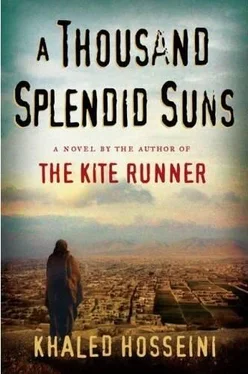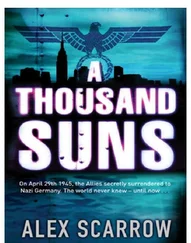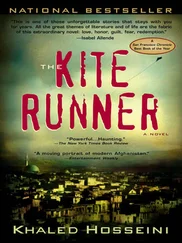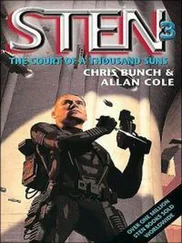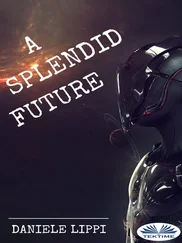"What's the matter with you?"
"You're bleeding, hamshira!"
Mariam turned one corner, then the other. She found the correct street but suddenly could not remember which was Rasheed's house. She ran up then down the street, panting, near tears now, began trying doors blindly. Some were locked, others opened only to reveal unfamiliar yards, barking dogs, and startled chickens. She pictured Rasheed coming home to find her still searching this way, her knee bleeding, lost on her own street. Now she did start crying. She pushed on doors, muttering panicked prayers, her face moist with tears, until one opened, and she saw, with relief, the outhouse, the well, the toolshed. She slammed the door behind her and turned the bolt. Then she was on all fours, next to the wall, retching. When she was done, she crawled away, sat against the wall, with her legs splayed before her. She had never in her life felt so alone.
WHEN RASHEED CAME HOME that night, he brought with him a brown paper bag. Mariam was disappointed that he did not notice the clean windows, the swept floors, the missing cobwebs. But he did look pleased that she had already set his dinner plate, on a clean sofrah spread on the living-room floor.
"I made daal," Mariam said.
"Good. I'm starving."
She poured water for him from the aftawa to wash his hands with. As he dried with a towel, she put before him a steaming bowl of daal and a plate of fluffy white rice. This was the first meal she had cooked for him, and Mariam wished she had been in a better state when she made it. She'd still been shaken from the incident at the tandoor as she'd cooked, and all day she had fretted about the daal's consistency, its color, worried that he would think she'd stirred in too much ginger or not enough turmeric.
He dipped his spoon into the gold-colored daal.
Mariam swayed a bit. What if he was disappointed or angry? What if he pushed his plate away in displeasure?
"Careful," she managed to say. "It's hot."
Rasheed pursed his lips and blew, then put the spoon into his mouth.
"It's good," he said. "A little undersalted but good. Maybe better than good, even."
Relieved, Mariam looked on as he ate. A flare of pride caught her off guard. She had done well – maybe better than good, even – and it surprised her, this thrill she felt over his small compliment. The day's earlier unpleasantness receded a bit.
"Tomorrow is Friday," Rasheed said. "What do you say I show you around?"
"Around Kabul?"
"No. Calcutta."
Mariam blinked.
"It's a joke. Of course Kabul. Where else?" He reached into the brown paper bag. "But first, something I have to tell you."
He fished a sky blue burqa from the bag. The yards of pleated cloth spilled over his knees when he lifted it. He rolled up the burqa, looked at Mariam.
"I have customers, Mariam, men, who bring their wives to my shop. The women come uncovered, they talk to me directly, look me in the eye without shame. They wear makeup and skirts that show their knees. Sometimes they even put their feet in front of me, the women do, for measurements, and their husbands stand there and watch. They allow it. They think nothing of a stranger touching their wives' bare feet! They think they're being modern men, intellectuals, on account of their education, I suppose. They don't see that they're spoiling their own nang and namoos, their honor and pride."
He shook his head.
"Mostly, they live in the richer parts of Kabul. I'll take you there. You'll see. But they're here too, Mariam, in this very neighborhood, these soft men. There's a teacher living down the street, Hakim is his name, and I see his wife Fariba all the time walking the streets alone with nothing on her head but a scarf. It embarrasses me, frankly, to see a man who's lost control of his wife."
He fixed Mariam with a hard glare.
"But I'm a different breed of man, Mariam. Where I come from, one wrong look, one improper word, and blood is spilled. Where I come from, a woman's face is her husband's business only. I want you to remember that. Do you understand?"
Mariam nodded. When he extended the bag to her, she took it.
The earlier pleasure over his approval of her cooking had evaporated. In its stead, a sensation of shrinking. This man's will felt to Mariam as imposing and immovable as the Safid-koh mountains looming over Gul Daman.
Rasheed passed the paper bag to her. "We have an understanding, then. Now, let me have some more of that daal."
Mariam had never before worn a burqa. Rasheed had to help her put it on. The padded headpiece felt tight and heavy on her skull, and it was strange seeing the world through a mesh screen. She practiced walking around her room in it and kept stepping on the hem and stumbling. The loss of peripheral vision was unnerving, and she did not like the suffocating way the pleated cloth kept pressing against her mouth.
"You'll get used to it," Rasheed said. "With time, I bet you'll even like it."
They took a bus to a place Rasheed called the Shar-e-Nau Park, where children pushed each other on swings and slapped volleyballs over ragged nets tied to tree trunks. They strolled together and watched boys fly kites, Mariam walking beside Rasheed, tripping now and then on the burqa's hem. For lunch, Rasheed took her to eat in a small kebab house near a mosque he called the Haji Yaghoub. The floor was sticky and the air smoky. The walls smelled faintly of raw meat and the music, which Rasheed described to her as logari, was loud. The cooks were thin boys who fanned skewers with one hand and swatted gnats with the other. Mariam, who had never been inside a restaurant, found it odd at first to sit in a crowded room with so many strangers, to lift her burqa to put morsels of food into her mouth. A hint of the same anxiety as the day at the tandoor stirred in her stomach, but Rasheed's presence was of some comfort, and, after a while, she did not mind so much the music, the smoke, even the people. And the burqa, she learned to her surprise, was also comforting. It was like a one-way window. Inside it, she was an observer, buffered from the scrutinizing eyes of strangers. She no longer worried that people knew, with a single glance, all the shameful secrets of her past.
On the streets, Rasheed named various buildings with authority; this is the American Embassy, he said, that the Foreign Ministry. He pointed to cars, said their names and where they were made: Soviet Volgas, American Chevrolets, German Opels.
"Which is your favorite?" he asked
Mariam hesitated, pointed to a Volga, and Rasheed laughed
Kabul was far more crowded than the little that Mariam had seen of Herat. There were fewer trees and fewer garis pulled by horses, but more cars, taller buildings, more traffic lights and more paved roads. And everywhere Mariam heard the city's peculiar dialect: "Dear" was jan instead of jo, "sister" became hamshira instead of hamshireh, and so on.
From a street vendor, Rasheed bought her ice cream. It was the first time she'd eaten ice cream and Mariam had never imagined that such tricks could be played on a palate. She devoured the entire bowl, the crushed-pistachio topping, the tiny rice noodles at the bottom. She marveled at the bewitching texture, the lapping sweetness of it.
They walked on to a place called Kocheh-Morgha, Chicken Street. It was a narrow, crowded bazaar in a neighborhood that Rasheed said was one of Kabul 's wealthier ones.
"Around here is where foreign diplomats live, rich businessmen, members of the royal family – that sort of people. Not like you and me."
"I don't see any chickens," Mariam said.
Читать дальше
